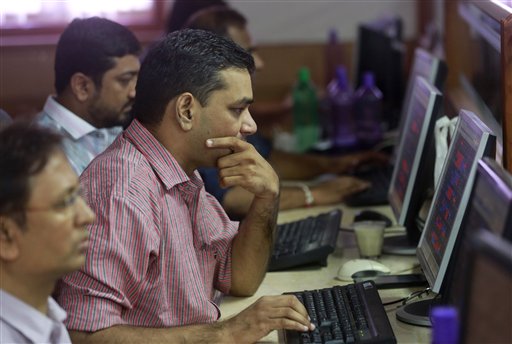
An Indian stock broker reacts as he watches the Bombay Stock Exchange (BSE) index on his trading terminal in Mumbai, India, on Tuesday, Aug. 25, 2015. Chinese stocks fell Tuesday for a fourth day, hitting an eight-month low amid signs Beijing was no longer buying shares to stem a price slide, and Japanese stocks also dropped. But other Asian and European markets bounced back from a day of heavy losses. AP PHOTO/RAFIQ MAQBOOL
HONG KONG—Asian markets were mixed after a seesaw session on Tuesday, with Tokyo diving and Shanghai extending its worst rout in almost 20 years, while other regional markets bounced into positive territory.
The dollar remained weak and oil prices stayed in the doldrums after finishing Monday below $40 a barrel for the first time in six years.
Shanghai plummeted 7.63 percent, or 244.94 points, to 2,964.97, wiping out the year’s gains and continuing its steepest four-day rout since 1996.
Tokyo dropped 3.85 percent to close 733.98 points lower at 17,806.70—its sixth straight day of falls and the lowest finish since mid-February.
But other regional shares bounced back into positive territory after a bruising session overnight that saw Wall Street fall the most since the height of the financial crisis and European equities slump.
Sydney closed up 2.72 percent, or 136.02 points, at 5,137.30, while Seoul rose 0.92 percent, or 16.82 points, at 1,846.63 and Hong Kong added 0.72 percent, or 153.39 points, to close at 21,404.96.
“It will take a big policy reaction out of China” to trigger a proper rebound in global shares, Isao Kubo a strategist at Nissay Asset Management, told Bloomberg News.
“It’s best to expect high volatility for the foreseeable future rather than jump to conclusions about if this is the end or not.”
‘Running out of room’
Global equities took a battering overnight after an almost 8.50 percent slump in Shanghai—the heaviest daily loss since 2007—sparked panic among world investors.
World equity markets have seen some $5 trillion wiped off their value since China’s surprise devaluation of the yuan on Aug. 11 added to fears the world’s second-largest economy is weaker than thought.
Chinese shares have been on a roller-coaster ride after a year-long debt-fueled rally collapsed in mid-June, prompting the government to unleash a vast package of measures to support shares.
In its latest move, China’s central bank late Tuesday cut benchmark interest rates and the amount of cash banks must keep on hand, reducing lending and deposit interest rates by 0.25 percentage points each and its reserve requirement ratio (RRR) by 0.50 percentage points.
These take effect Wednesday, the People’s Bank of China said, and follow similar tandem cuts in late June.
The news comes after Beijing said Sunday the state pension fund will now buy stocks. On Tuesday the central bank also injected 150 billion yuan ($23.4 billion) into the money market to ease tight liquidity.
The dollar remained weak at 119.15 yen, up from 118.51 yen in New York trade Monday but dramatically weaker than 122.06 yen seen in US trading on Friday.
The euro stood at $1.1550 and 138.10 yen in Tokyo compared with $1.1606 and 137.55 yen in New York overnight.
US benchmark West Texas Intermediate (WTI) for October delivery was trading at $38.97 after closing at $38.24 a barrel on the New York Mercantile Exchange, its first below-$40 close since February 2009.
Brent North Sea crude for October, the international benchmark, was at $43.43 a barrel after closing at $43.04 a barrel in London, its lowest level since March 2009.
Gold traded at 1,149.80 compared to $1,154.00 late Monday.
In other markets:
— Taipei added 3.58 percent, or 265.30 points, to 7,675.64.
Taiwan Semiconductor Manufacturing Co. rose 7.39 percent to Tw$123.50 while Hon Hai Precision advanced 4.17 percent to Tw$85.0.
— Wellington added 0.11 percent, or 5.98 points, to 5,613.29.
Contact Energy rose 2.70 percent to NZ$5.32 and Air New Zealand was down 0.75 percent to NZ$2.65.
— Manila rose 0.58 percent, or 39.33 points, to 6,830.34 although trading was suspended for much of the day due to technical problems.
Ayala Land was down 0.74 percent to 33.50 pesos, Universal Robina was unchanged at 180 pesos and BDO Unibank was down 0.95 percent at 94.10 pesos.
— Bangkok gained 1.75 percent, or 22.82 points, to 1,323.88.
Travel industry stocks led the gains with Airports of Thailand jumping 3.54 percent to 263 baht while Bumrungrad Hospital, a popular medical tourist destination, soared 7.04 percent to 228 baht.
— Kuala Lumpur ended up 2.08 percent, or 31.80 points, at 1,563.94.
Sime Darby added 1.42 percent to 7.12 ringgit, Telekom Malaysia gained 4.68 percent to 6.48 ringgit while Maybank lost 0.12 percent to 8.31 ringgit.
— Jakarta ended up 1.56 percent, or 64.77 points, at 4,228.50.
Lender Bank Mandiri gained 3.98 percent to 8,500 rupiah, while conglomerate Astra International slipped 1.32 percent to 5,600 rupiah.
— Singapore closed up 1.51 percent, or 42.90 points, higher at 2,886.29.
United Overseas Bank climbed 3.77 percent to end at Sg$19.25 and oil rig maker Keppel Corp. surged 7.70 percent to end at Sg$6.99.
— Mumbai rose 1.13 percent, or 290.82 points, to close at 26,032.38.
Natural resources company Vedanta increased 7.73 percent to 86.45 rupees after plunging more than 15 percent on Monday while Housing Development Finance Corporation fell 1.82 percent to 1145.60 rupees.